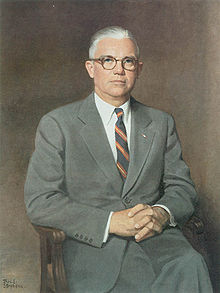Robert T. Stevens
Robert Ten Broeck Stevens (born July 31, 1899 in Fanwood , New Jersey , † January 31, 1983 in Edison, New Jersey ) was an American businessman and former chairman of the board of JP Stevens Company , an established textile manufacturer in the United States. He was also Secretary of the United States Army between 1953 and 1955 .
Career
Robert T. Stevens received his PhD from Phillips Andover in 1917 . He interrupted his studies in 1918 to serve as a second lieutenant in the field artillery in the First World War . After the war, he received his doctorate from Yale University in 1921 and began working for the textile manufacturer JP Stevens Company. In 1923 he married Dorothy Goodwin Whitney. Between 1929 and 1942 he was chairman of the board of directors of JP Stevens Company. In 1933, Stevens became an industrial deputy for the National Recovery Administration . He was then a class B director of the Federal Reserve Bank of New York between 1934 and 1955 . From 1948 to 1953 he was director class C, as well as chairman, this. In 1941 he attended a special course at the Command and General Staff School at Fort Leavenworth . He then held active service in the army in 1942, first with the rank of Lieutenant Colonel and later Colonel . Until 1945 he served in the office of the Quartermaster General of the Procurement Division with a short stay in the European theater of war.
After the war he returned to the JP Stevens Company as chairman of the committee. He held this office between 1945 and 1953. In 1951 and 1952 he was also Chairman of the Trade Advisory Council of the US Department of Commerce . He was Secretary of the United States Army from February 4, 1953 to July 21, 1955. He oversaw spending cuts after the Korean War . He also suggested increasing the security of the main industrial facilities in order to react immediately in an emergency. Between 1953 and 1954 he defended the army against the reckless indictments of the advanced US Senator Joseph McCarthy of Wisconsin in Congress (Army McCarthy hearings), who made inquiries into communist influence in the government.
After serving as Secretary of the United States Army, he returned to JP Stevens Company to assume the position of chairman. He held this office from 1955 to 1959. He was then chairman of the board of this company between 1969 and 1974. Robert T. Stevens died on January 31, 1983 in Edison, New Jersey.
Army McCarthy Hearings
Stevens came into conflict with Senator Joseph McCarthy over a number of subjects that ultimately led to the 1954 Army McCarthy hearings . In the 1953 case, McCarthy began an investigation at the US Army Signal Corps Research Facility at Fort Monmouth . McCarthy's aggressive questioning of military personnel was morale without being able to unearth any evidence pointing to "questionable informers" whose existence McCarthy claimed to be. McCarthy next investigated the case of Irving Peress , a military dentist who preferred not to answer his questions on a loyalty questionnaire.
When several officers, scientists, and other military personnel were subjected to frequently abusive interrogation by McCarthy, Stevens was criticized for his duty towards McCarthy's request and his failure to support his men.
Coinciding with these events, McCarthy's lead prosecutor, Roy Cohn , has urged the Army, including Stevens, to put his friend Gerard David Schine , who was recently called up, on favored trial. The Army McCarthy hearings were held to investigate the army command through McCarthy and Cohn's objectionable interrogation in the interests of Shien, as well as McCarthy's counterattack so that the "hostage" machine was braked in one of McCarthy's endeavors Stop investigating the army.
During the hearings, McCarthy questioned Stevens for individual days. Though Stevens was usually careful about the hearings, it was McCarthy, through his tasteless months of investigation. The exposure of McCarthy's methods in front of a television appearance and his conduct during the hearings was seen as the main reason for his ultimate downfall.
Stevens wanted to resign after this incident, but was convinced by Vice President Richard Nixon not to do so. Steven's tenure ended in July 1955. He then returned to his family textile business, where he ran the JP Stevens Company until he retired at the age of 70.
Web links
- Army biography
- Robert T. Stevens in the database of Find a Grave (English)
Footnotes
- ^ Robert D. McFadden: Robert T. Stevens, Former Army Secretary, Dies At 83 . In: The New York Times . February 1, 1983
- ↑ Geoffrey R. Stone: Perilous Times. Free Speech in Wartime from the Sedition Act of 1798 to the War on Terrorism. WW Norton & Company, 2004, ISBN 0-393-05880-8 , p. 384
- ↑ William K. Klingaman: Encyclopedia of the McCarthy Era. Facts on File, 1996, ISBN 0-8160-3097-9 , p. 350
- ^ Richard M. Fried: Nightmare in Red. The McCarthy Era in Perspective. Oxford University Press, 1990, ISBN 0-19-504361-8 , p. 138
- ↑ John G. Adams: Without Precedent. The Story of the Death of McCarthyism. WW Norton & Company, 1983, ISBN 0-393-30230-X .
| personal data | |
|---|---|
| SURNAME | Stevens, Robert T. |
| ALTERNATIVE NAMES | Stevens, Robert Ten Broeck |
| BRIEF DESCRIPTION | American businessman, United States Secretary of the Army (1953–1955) |
| DATE OF BIRTH | July 31, 1899 |
| PLACE OF BIRTH | Fanwood , New Jersey |
| DATE OF DEATH | January 31, 1983 |
| Place of death | Edison , New Jersey |

